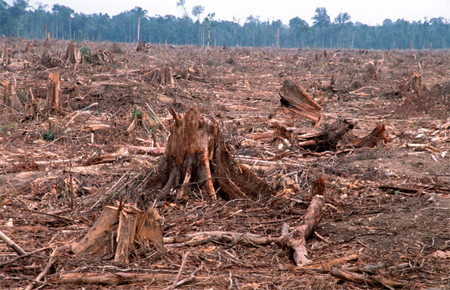Modernity Is More Expensive
Than You Think

Our modern scientific and technological world is built on a belief in the autonomy of natural systems and the unbounded resourcefulness of science and technology as tools to understand the universe. Our faith in these systems, once thought liberating, has brought us pollution, a defoliated and ravaged wilderness, and nuclear threat, all symptoms of an environmental crisis that puts our existence and life on earth in jeopardy.
The golden age of science that ushered in the industrial revolution began with Copernicus, who in the early 1500s set in motion a series of inquiries that culminated with the publication in 1687 of Sir Isaac Newton’s Principia Mathematica. Scientific explanation spread widely, permeating the social fabric of western society and the globe. Science would free us from the burdens of scarcity and help us conquer nature. Our productivity and consumption would increase.
They certainly did, and we are now in an age of bondage to materialism, in which a focus on self-interest has estranged us from each other and brought us to an environmental precipice. We are working harder and craving more, some of us in an effort to fill an internal emptiness that no level of material consumption will satisfy. The priority we’ve assigned to increased production must be taken away if we are to deal successfully with the fallout bestowed on us so far.
What are we producing? Our modern production mantra emphasizes quantity over quality. This fails to recognize the elementary law of matter, based on the second law of thermodynamics, which is that any productive process is simply an irreversible transformation of low entropy into high entropy. Entropy is the measure of energy no longer available due to its dissipation through over-production. In other words, the greater the level of activity, the less the availability of resources for the future.
It is regrettable that the field of economics has not fully realized its own entropic underpinnings. It might have warned that bigger is not always better. A world intoxicated with the idea of consumption measures progress in quantifiable terms. A larger gross domestic product must go hand in hand with a “better” standard of living. This emphasis on material consumption has led to misguided, false, and sometimes sacrilegious principles of economic development, based on the central role capital is expected to play in transforming a traditional society into an industrial one.
Our faith in science and technology, once thought liberating, has brought us pollution, a defoliated and ravaged wilderness, and nuclear threat, all symptoms of an environmental crisis that puts our existence and life on earth in jeopardy.
Neither the welfare of generations to come nor the deterioration of our delicate ecosystem is an issue for those who pursue such an economic growth model. The phrase “economic development” denotes a specific pattern of production, consumption, and behavior we should all aspire to, whether or not it is qualitatively desirable. Growth-mania is predicated on an anthropocentric view in which everything is sacrificed to attain the growth, even though the process may be built on greed or hedonistic acquisitiveness and there is no culturally sustaining purpose and no distinction between good and bad outcomes.
The English philosopher John Stuart Mill best captured this spirit of greed when he said, “Men do not desire to be rich, but to be richer than other men." In other words, the most covetous among us aren’t satisfied with any level of wealth.
An economic system is shaped by the mores and values of its society, and therein lies hope for the future. We need new values. We must adopt a new paradigm that respects the earth, looks to the future, and concerns itself with equity and sharing. We must go outside the realm of science and examine what kind of economic and political order should prevail.

© Alain Compost/World Wildlife Federation–Canon. See also Alina Bradford, http://www.livescience.com/27692-deforestation.html
A society cognizant of the law of entropy would reallocate finite resources towards socially and environmentally responsible uses. The more we use our resources, the less we will have for the future. We should take a hard look at our anthropocentric presumption that we ourselves are the center of the universe, and develop and teach an eschatology that frees us from too much materialism and makes “progress” meaningful.
No level of activity, economic or otherwise, is justifiable unless it is simultaneously sustainable. We must learn to respect and protect nature since we are part of it, and not apart from it. This is a condition for formulating a sense of ethics that correct our environmental transgressions.
The environmental crisis has given us a future of uncertainty, but there are ways to challenge that and give us hope for the future. Our economic models should include consumption habits that can promote sustainability and put to rest the infatuation with economic “growth”. We should eliminate our dependence on fossil fuels, in an effort to contain the damage done through global warming. And we must protect the intrinsic rights of all species (who have as much right to be here as we do) to preserve ecological diversity.
If we do not incorporate these ideas into our global policies and models, humanity will be looking towards a future with little hope. And that will be tragic.
And finally, dear reader, ask yourself the question whether the current political, social, economic, demographic, and environmental policies of any country in the world are sustainable?
Works Cited
John Stuart Mill, Posthumous Essay on Social Freedom (Oxford & Cambridge Rev. Jan. 1907, quoted in A.C. Pigou, The Economics of Welfare 89-90, 1948.)
Comments? Please send your responses
on the site's Contact page.Thank you!
